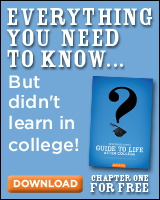What Did You Like About College?

Anyone who watches Gossip Girl knows that college admissions have gotten totally out of hand. If the new CW drama (aka the O.C. of the Upper East Side) is to be believed, there are now only eight reasonable schools in the country (all Ivies—going “out West” is a joke), and you have to have a hyphenated last name and penthouse apartment to even think about meeting the campus reps when they drop by your high school.
Ok, so maybe it’s not to be believed. But even in the time since we were young bucks, the admissions game has upped the ante several times over. Reputation, US News & World Reports rankings, and “unique” programs that most students won’t even take advantage of all play into the soul-crushing process. Rarely, though, does anyone ask the graduates of different colleges (as opposed to the kids still there) whether they actually liked their school and how it’s affected them post graduation.
A recent survey conducted by the New York Times (in conjunction with MTVu) asked grads to reflect on their college experiences, and the general consensus seemed to support the feeling I’ve had since leaving my dorm room: When it comes to “having a good experience,” it doesn’t really matter where you went. As author Jacques Steinberg explains, “Among the group surveyed nationally, 93 percent described their overall undergraduate experience as ‘excellent’ or ‘good’; the results were comparable for the alumni of Penn (95 percent), Michigan (96 percent) and Reed (98 percent).”
Anyway, you can check out the full poll results in the article, but here are some things I found interesting:
- About one-third at each university said that the rankings seemed “less important” to them now than they did in high school
- X-factors that get a lot of play in college-hunting (like climate, location, and school spirit) ranked very low (1-3%) on people’s lists in retrospect.
- “Friends” faired well across the board (8-21%) when grads were ranking the best thing about their undergraduate experience.
- 2% of respondents chose “Nothing” as the best part of college (that’s not really useful, just amusing).
Point being, most of the criteria that go into “finding the right college” are completely misaligned with what people who have been through the fire took from the experience. If I had to list my favorite things about college, I’d probably include drinking mad iced coffees, competing in two burrito-eating contests, and making out with a few girls. Admittedly, there is an especially high density of Dunkin Donuts locations in the Boston area, but in general these things could be achieved almost anywhere. All colleges have people you will like and people you will hate, classes that are incredible and classes that are terrible, etc.
The only thing I think Steinberg gets wrong is his suggestion that we should “help [high-school students] prepare a little better for how to strike a balance, or explore what they hope to accomplish, once they get there.” The largest source of regret for respondents was that they didn’t take advantage of all the “opportunities” at their college. But that is preparation for life, where the grass is literally always greener.
For people our age, it is almost impossible to imagine how older folk with families and mortgages and “real” jobs remain sane, because we have seen since graduation how stressful it is to just deal with boyfriends/girlfriends, one-year leases, and internships (until Gradspot.com came around, of course). In many ways, part of the reason I look back on college with some fondness is because I didn’t have to constantly second-guess my decisions as much—the notion of “going to school” seemed useful enough to help me overlook some moments of poor prioritization. That becomes harder to do after graduation, but the experience is still a formative one that, in my mind, can’t really be “taught” before college and with a high level of day-to-day supervision.
Ironically, ignorance is bliss in college. Probably not what parents and college admissions officers want to hear, but so it goes.
XOXO,
Gradspot
PS It should be noted that some parts of the survey don’t support the “everywhere is the same” hypothesis. Most tellingly, when asked if a college education is necessary for career success, 75% and 69% of the grads polled from UPenn and Michigan said yes, respectively; nationally, it was only 44%. I see that as a sort of self-fulfilling prophecy: only if a grad becomes successful will they give their school credit for it, so presumably UPenn and Michigan students have faired a bit better.





Comments
(0)POST YOUR COMMENT